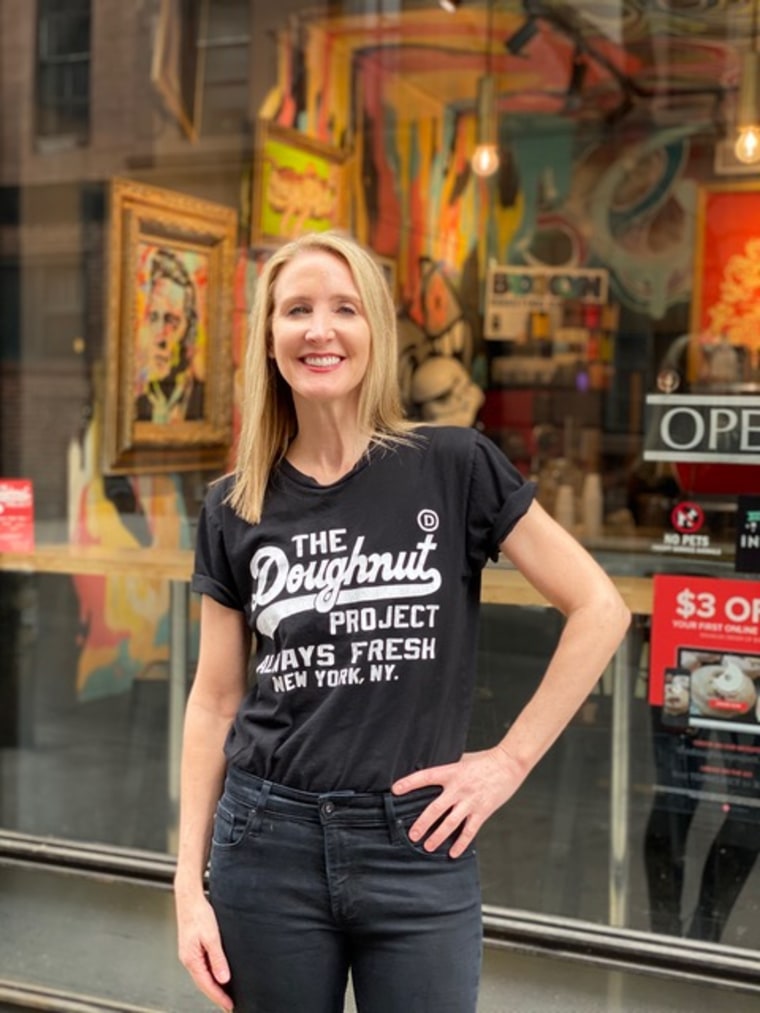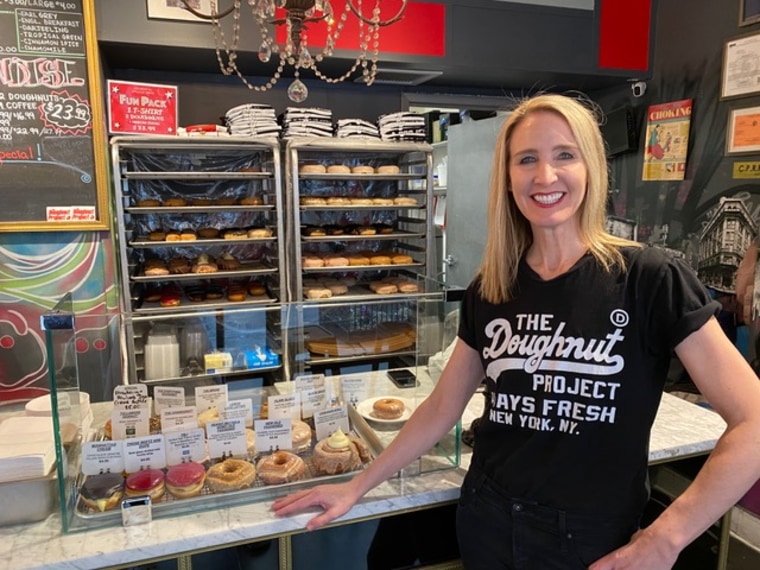A conversation about doughnuts at a New York City bar changed Los Angeles-based attorney Leslie Polizzotto’s career and life.
Polizzotto, 51, and her husband were in New York for business in 2012 when they stopped to eat at a bar at Eataly, the famed Italian gourmet marketplace in the Flatiron District. Polizzotto started speaking to the bartender, Troy Neal.
"Troy mentioned to me that he wanted to open a doughnut shop. I told him I loved doughnuts. I pulled out pictures of doughnuts on my phone. I told him how happy they would make me when someone would bring them to the law firm. I said ‘maybe I can help you,’” she recounted.

And an idea was born. A few years later, Polizzotto and her husband moved to The Big Apple. Polizzotto passed the New York State Bar Exam, but while waiting for work from her firm, she started working on a business plan and raising capital for her doughnut venture with Neal. When the law firm reached out and said they had work for Polizzotto, she declined. "I said, nope I am going in a different direction."
Polizzotto walked away from that six-figure job offer practicing insurance coverage litigation in New York and pivoted to doughnuts. She worked with Neal to create The Doughnut Project, home to sweet treats inspired by fresh, seasonal, savory, and even cocktail flavors. The two partners raised $300,000 in funding from family and friends, as well as their own bank accounts.
“We were insane,” recounted Polizzotto. “My business partner was a bartender, not a chef. I was a lawyer. Do I cook? No. And we opened up a food shop in New York, the city with the biggest failure rate.”
"Neal had been practicing making doughnuts in a little mixer in his apartment, but when we first opened our doors [in 2015], he had never even touched a commercial mixer before. It was just sheer will and determination and actually making a good product and getting some good press in the beginning [that explains] why we are still around.”
Starting the venture was far from easy.
"We were undercapitalized when we opened,” Polizzotto explained. “Our renovation was supposed to take three months and it took six months, [leaving us] two months in the hole on rent. It was very stressful in the beginning to make rent, payroll, pay accounts payable, etc. and we did not take salaries for a very long time.”
But a combination of hard work and good fortune paid off.
"It seemed like every time we were at a low point, something positive would present itself,” she said.
“For example, in January 2016 we had been open for two months we were invited to participate in a “Doughnut Fest” happening in Brooklyn. We ended up winning crowd favorite which came with an awesome trophy and a $3,000 prize. Certainly a nice surprise for a struggling 2-month-old business. Then a month later, we received an unbelievable amount of press when our Everything Doughnut went viral on Instagram and the Internet and was written about by many news outlets and was on every daytime television show. That doughnut changed our life overnight and put our unique doughnut shop on the map,” Polizzotto added.
Doughnuts with a twist
Polizzotto and Neal pride themselves in their unique take on traditional doughnuts. There’s one infused with sparkling rosé and topped with edible rose petals. There’s also a maple glazed doughnut with bacon, and another with beets and ricotta.
The product was a hit. After opening in 2015, The Doughnut Project now boasts two New York stores, is expanding around the country and is even franchising internationally.

This isn’t just a doughnuts-to-dollars story, it’s one about taking a risk, making a career change, and crushing it at 50 and beyond, subjects Mika Brzezinski and I talk about extensively in our new book, “Comeback Careers: Rethink, Refresh, Reinvent Your Success At 40, 50, and Beyond.”
“My motto is it’s never too late,” said Polizzotto. “I have a very unconventional path to how I got here. I worked for a construction management company straight out of high school. I didn’t go to college until I was 29. I didn’t go to law school until I was 38. Law was my second career and then entrepreneur was my third. I really think with each career you gain more knowledge and more confidence. You just don’t know a whole lot when you are young about how businesses run.”
Polizzotto was recently named to The Story Exchange’s Fearless Over 50 , a list of powerful women entrepreneurs who launched companies later in life.
Colleen DeBaise, the creator of the list, said Polizzotto is an example of women who are changing the narrative of women who are 50 and older. Not only is it never too late to start, it’s smart to start a business over 50. “When it comes to successful leadership qualities — things like patience, confidence, resilience, persistence, strength and courage — those attributes often come a little later in life. Knowledge, after all, is accumulated over a lifetime,” said DeBaise.
In fact, women who start businesses after the age of 45 are growing in number. According to the American Express 2018 State of Women-Owned Business Report, the number of female owned businesses with revenue of more than $1 million increased 46 percent over the past 11 years. And, that same report found that more than two-thirds of all female owned businesses are led by women aged 45 or older. Why? Maybe in part because these women have better networks, access to capital and more accumulated business experience.
Another study from Harvard Business Review found that successful entrepreneurs tend to be middle-aged, not the stereotypical young, male who works in tech. The study also found that the odds of a start-up’s success rises with age, at least until late 50s.
Polizzotto said her experience has given her confidence and resilience. Would she have done this at 30? “I definitely think I would not have done it early on,” she said. “…I think being older, it makes you wiser. You have a lot of skills in your back pocket that give you confidence to be successful and take on challenges.”
Advice to others
Polizzotto said there are several pieces of advice she tells aspiring food entrepreneurs:
“You need a really good idea or concept or product that is unique. For us, it was our flavor inspiration from food and cocktails… No one had done that,” she said.
Her second piece of advice: “Partner with people with different skills sets than you. My partner was a bartender who was social and knew about hospitality and I came with the background of structure and checklists and more of the corporate side of things. If we were both like him or if we were both like me, the business probably would have failed.”
She also stressed the importance of pursuing a career that brings you joy at the end of the day.
“I worked in litigation and it’s a very negative environment, very confrontational. My day now involves making people happy. People come into my shop and they leave with a smile on their face,” she said.
“I gave up a six-figure income to not take a salary for a year. That’s not everyone’s option. But looking back I would never go back to that life of 9-5. It is so rewarding to do your own thing and run your own business. It just becomes your life. Every day you are thinking, 'how can I make it better? How can I grow it?' I am glad I took the leap, it has been totally worth it.”
